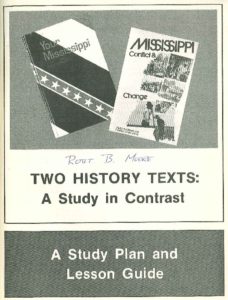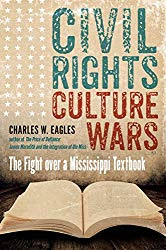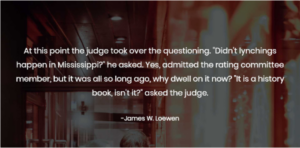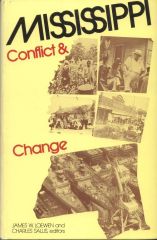
In 1963, James W. Loewen went to Mississippi as an undergraduate. In 1997, Stephen Berrey came to the state. Both chose Mississippi because it exemplified social processes in the United States in a more exaggerated, hence clearer, form. Both wrote their first books about Mississippi. We include these items, hoping they have value to people learning or teaching about Mississippi or about the United States but using Mississippi as an example.
Mississippi: Conflict and Change
After getting a grant from the Southern Education Foundation, I recruited students and faculty from Tougaloo College and from Millsaps College, the nearby white college, to write a new textbook of Mississippi history, aimed at ninth-grade students. “Mississippi History” was required in ninth grade and also in fifth grade, requirements enacted by the legislature in 1956 as part of the white supremacist reaction to Brown v. Board of Education, the 1954 Supreme Court decision that called for school desegregation. The idea had been to defend “the Southern way of life” (racial segregation) by indoctrinating white and black students to believe that the only time African Americans were allowed to be citizens (Reconstruction) was a disaster. It wasn’t true, but teaching it was effective in convincing even black students of this lie.
“A Lesson from Mississippi”: A Synopsis of the MS History Project.
Famed writer Robert Coles reviewed Mississippi: Conflict and Change shortly after it came out.
Assessments of Mississippi: Conflict and Change
 A year after Pantheon published Mississippi: Conflict and Change, out of the blue appeared in the mail a copy of a 24-page booklet, “Two History Texts: a Study in Contrast” (NYC: The Racism and Sexism Resource Center for Educators, 1976). Affiliated with the Council on Interracial Books for Children, a NYC organization that was important in the 1970s, its author, Robert B. Moore, compared our book to John Bettersworth’s Your Mississippi. He called Conflict and Change “far superior in form and content to all history textbooks we have seen.” Your Mississippi, on the other hand, on the other hand, “should not have been adopted” because it “is too distorted, biased, and full of omissions to qualify for use as a history text.”
A year after Pantheon published Mississippi: Conflict and Change, out of the blue appeared in the mail a copy of a 24-page booklet, “Two History Texts: a Study in Contrast” (NYC: The Racism and Sexism Resource Center for Educators, 1976). Affiliated with the Council on Interracial Books for Children, a NYC organization that was important in the 1970s, its author, Robert B. Moore, compared our book to John Bettersworth’s Your Mississippi. He called Conflict and Change “far superior in form and content to all history textbooks we have seen.” Your Mississippi, on the other hand, on the other hand, “should not have been adopted” because it “is too distorted, biased, and full of omissions to qualify for use as a history text.”
 The University of North Carolina Press recently released a new book by Ole Miss historian Charles W. Eagles, Civil Rights, Culture Wars: The Fight over a Mississippi Textbook. It tells the story of the project that created the new textbook, describes the product, and then tells of the lawsuit required to force its adoption by the State of Mississippi.
The University of North Carolina Press recently released a new book by Ole Miss historian Charles W. Eagles, Civil Rights, Culture Wars: The Fight over a Mississippi Textbook. It tells the story of the project that created the new textbook, describes the product, and then tells of the lawsuit required to force its adoption by the State of Mississippi.
The lead article in The Journal of Mississippi History, 72#1 (Spring 2010) is Rebecca Miller Davis, “The Three R’s — Reading, ‘Riting, and Race: The Evolution of Race in Mississippi History Textbooks,” pp. 1-45. She concluded, “Conflict and Change and the court case that put it in the schools were turning points for Mississippi education …”
In the federal lawsuit, Loewen et al. v. Turnipseed et al. (488 F. Supp. 1138), Judge Orma Smith concluded “that the textbook Mississippi: Conflict and Change was not rejected for any justifiable reason.” Instead, “the rejection of this textbook was motivated and influenced by racial issues.”
Journalist Jason Berry, who had lived in Mississippi and New Orleans, gave Mississippi: Conflict and Change a glowing write-up in 1975 in “Teaching Mississippi History,” The New York Times.
Other Resources for Teaching Mississippi History
- Here are two sites that have much information about the Civil Rights Movement in Mississippi (and other states). If you teach K-12 (or college) in MS or about MS, these may be useful to you and your students. Don’t be overwhelmed, just see what’s there and use some of it. The first is maintained by veterans of the Civil Rights Movement, the second by Brown University.
- American Radio Works did a series on the Civil Rights Movement in Mississippi that teachers can assign students to listen to, if they wish.
What You Can Do to Cause Social Change in Mississippi
Loewen et al. v. Turnipseed et al. Vindicates Mississippi: Conflict and Change

- Here is the decision in Loewen v. Turnipseed.
- Herbert Mitgang, “Mississippi Textbook Dispute Revived,” NY Times, tells of the decision.
- Spencer Rich, “Miss. Must Allow Textbook That Stresses Black Role,” tells of the decision.
- The American Library Association calls the Turnipseed decision one of twelve historic cases giving us “The Right to Read Freely.”
- Loewen vs. Turnipseed continues to draw legal attention. Here is a treatment in Michael Imber and Tyll van Geel, Education Law, 4th ed. (NY: Routledge, 2010 [1992]), pp. 106-07.
- “First Amendment Timeline includes Loewen v. Turnipseed.”
- Ben Tumin referenced Loewen’s writing to describe racism in Mississippi public education and discussed the importance of the Loewen v. Turnipseed decision.
Maps Related to Mississippi History and Social Structure
Maps show remarkable similarities shedding light on the “Cultural Geography and the Study of Mississippi History and Social Structure”.
One of the strengths of Mississippi: Conflict and Change is its collection of maps, inviting students to look for relationships.
Short Biographies of Mississippians
Among other innovations, Mississippi: Conflict and Change featured short biographies of Mississippians, providing readers with enough detail that they might imagine the lives of individuals in various eras and occupations. Since then, Loewen has written additional vignettes of a few more recent Mississippians.
Articles and a Monograph about Mississippi
- Place Magazine 1972 article on Mississippi topography and social structure
- Monograph by Loewen, written in 1973, “School Desegregation in Mississippi.” Some of my predictions were overly optimistic, but I hope historians of race, education, and social change in the Deep South will find value in this piece. I wrote it at the behest of two sociologists, one of whom was Charles U. Smith, who had a grant to study school desegregation across the South.
- Loewen described how Jackson, Mississippi was able to achieve greater residential desegregation through school desegregation.
- My notes on Young Democrats meeting, 1965
- “They Thought He Was Black, so They Claimed the Inn Was Full”
- “Remembrance and Change in Neshoba County,” in Poverty & Race, 13 #4 (7/2004), 8-10m
Articles on Mississippi, 2000-2020
- Loewen wrote an article critical of the lynching photo in Mississippi: Conflict and Change that also contrasts racism in Mississippi compared to the North.
- Ten Little Mississippi Stories
- “Remembrance and Change in Philadelphia, Mississippi”
- “My Lynching Photo Problem, and Ours”
- “Registering to Vote, Then and Now”
Mississippi Jokes
- The first, “God Appears To Rev. C. L. Franklin,” I learned from an African American in the Mississippi Delta in the 1960s.
- The second, “Hominy Grits,” took place in the cafeteria at Tougaloo College early in the morning during the summer session in 1965.
- “Freud’s Four Stages of Sexuality in Mississippi,” took place in my first class at Tougaloo College, “Introduction to Sociology,” in fall 1968.
- Joke four, “Naming My Mansion,” also took place in my “Introduction to Sociology” class at Tougaloo, but several years later.
